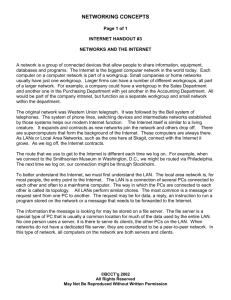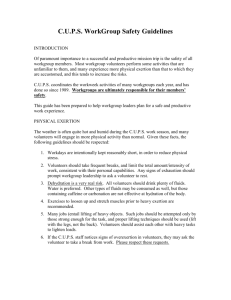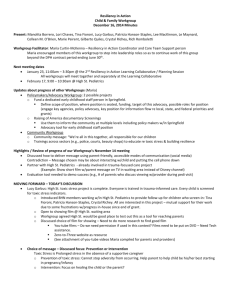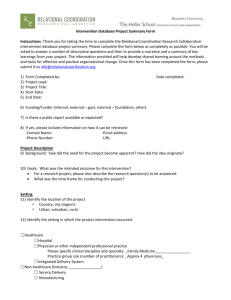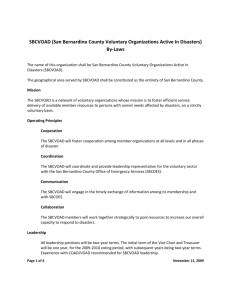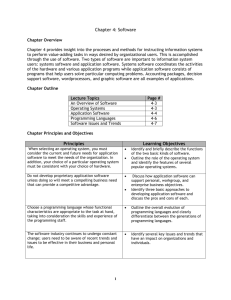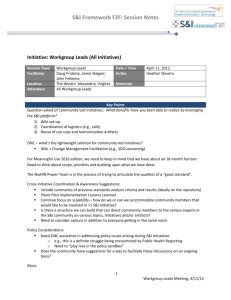Welcome To The Music Business Association
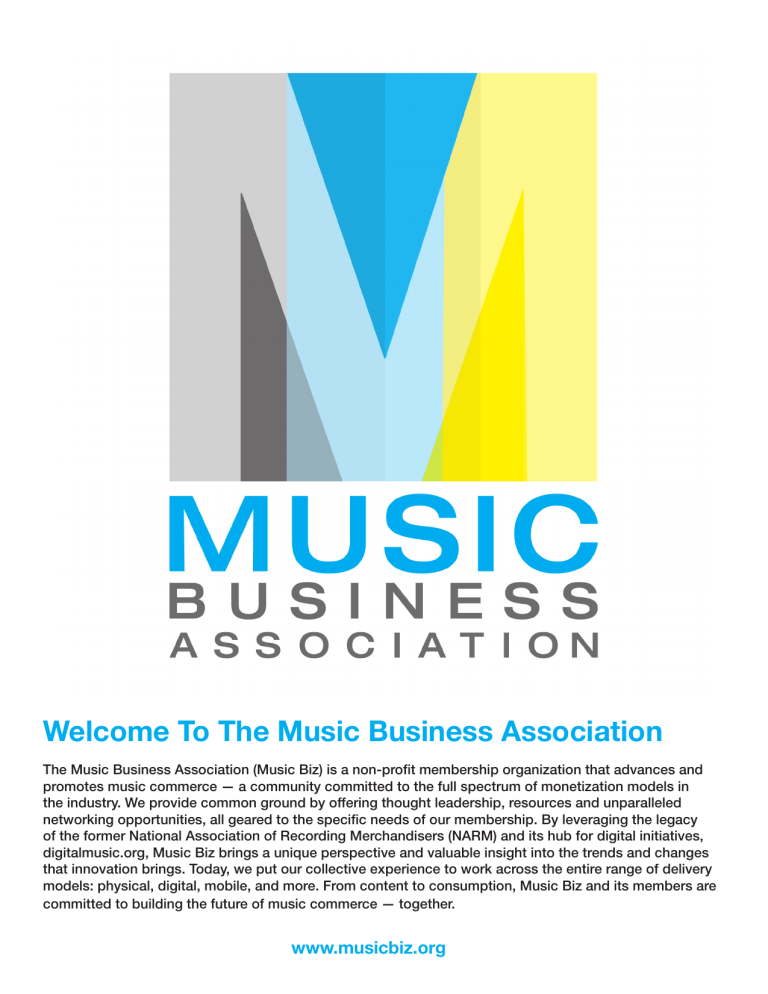
Welcome To The Music Business Association
The Music Business Association (Music Biz) is a non-profit membership organization that advances and promotes music commerce — a community committed to the full spectrum of monetization models in the industry. We provide common ground by offering thought leadership, resources and unparalleled networking opportunities, all geared to the specific needs of our membership. By leveraging the legacy of the former National Association of Recording Merchandisers (NARM) and its hub for digital initiatives, digitalmusic.org, Music Biz brings a unique perspective and valuable insight into the trends and changes that innovation brings. Today, we put our collective experience to work across the entire range of delivery models: physical, digital, mobile, and more. From content to consumption, Music Biz and its members are committed to building the future of music commerce — together.
www.musicbiz.org
Goals, Objectives And Components Of The
Music Business Association Rebranding And
Restructuring Plan
• Ensure perception of the organization as current, progressive and vital.
• Provide a clearer value proposition — anyone should be able to articulate who we are and what we do.
• Implement straightforward organizational structure that better fits today’s industry, and encourages member engagement and interaction.
• Foster environment of coopetition, within which results are member-centric and member-driven.
• Improve intra- and extra-organizational communication pathways.
Rebranding
The new brand, which merges NARM and digitalmusic.
org, better illustrates that the organization embraces the full spectrum of business segments with a stake in music commerce. We are not the physical music business or the digital music business, we are the entire music business. After more than a half-century being identified as an acronym, and with the word music never having been part in our name, we are highlighting the “M” for “Music” in the redesigned logo and typography. Our main URL will be musicbiz.org with the official
“shorthand” as Music Biz (not MBA), which aligns with the rebranding of the convention that began in 2011.
Organizational Restructure
The Association is now organized into activity-specific
“sectors” designed to allow members to get involved in areas that are relevant to their particular business needs and professional responsibilities. This approach is modeled on the successful structure of digitalmusic.
org’s targeted workgroups, and expands the concept to the new organization as a whole. Each sector must follow a set of Ground Rules, with a chair(s) approved by the Board. The chair(s) also have the opportunity to assemble a steering committee of sector members.
Members may participate in multiple sectors.
Governance And Staffing
The Board continues to set goals, objectives and direction, and monitors and measures results. Day-to-day management remains entrusted to the professional staff, led by the President. Sector chairs and workgroups help guide and prioritize work product, with staff support. In the initial stages, Board and staff will lead some sectors and workgroups to provide a seamless transition and maintain momentum. The current Board and Executive Committee will remain in place at least through the first full year to optimize the continuity of the rebranding and restructuring process. Four seats are being added to the Board from the content community. These companies were previously members of our Music Industry Advisory Council: The Orchard,
Sony, Warner, and Universal. The Board is considering two additional seats representing other music content companies. No adjustments are being made in the staff.
Administration
Board
Executive
Committee
President
Sectors
Workgroups
Professional
Staff
Physical Sector
Co-Chairs: Mike Fratt, Homer’s and
Ryan Redington, Amazon
The Physical Sector has a broad profile designed to ad dress the interests and issues pertaining to all types of physical commerce (retail and wholesale), as well as foster initiatives designed to promote sales of all forms of physical product, regardless of where it is sold. Specific workgroups are not yet formed. Preliminary topics on the agenda include: data-centric initiatives such as improving sales reporting and helping retailers identify opportunities with comparable sales data; opportunities in music DVD; issues around third party fulfillment; keeping
CDs in print and manufacturing on demand; expanding catalog offerings in vinyl; packaging; e-commerce best practices; and Record Store Day.
Digital Sector
Co-Chairs: Christina Calio, Microsoft, and
Kevin Arnold, OpenAura
• Business Development Workgroup
Co-Chairs: Bill Wilson and Cindy Charles
• Digital Marketing Workgroup
Co-Chairs: Chuck Fishman, Acquia and
Lee Hammond, Universal
• Subscription Services Workgroup
Chair: Jack Isquith, Slacker
Information Technology Sector
Steering Committee: Kevin Arnold, OpenAura;
Fred Beteille, YouTube; Josh Builder, The Orchard;
Ryan Redington, Amazon; Chris Read, Sony DADC;
Nick Sincaglia, Nuemeta; Bill Wilson
• Digital Supply Chain/Operations Workgroup
Co-Chairs: Chris Read, Sony DADC, and
Shachar Oren, Neurotic Media
• Digital Asset Management Workgroup
Co-Chairs: Maureen Droney, The Recording
Academy, and Paul Jessop, County Analytics
Knowledge Sector
• Research Workgroup, Chair: Nicole Hennessey
• Convention Workgroup, Chair: James Donio
• Scholarship Foundation Workgroup, Chair: Pat Daly
Artists, Management & Touring Sector
Legal & Business Affairs Sector
(Agenda and leadership will be announced in 2014.)
BOARD & EXECUTIVE COMMITTEE
Chairman: Rachelle Friedman,
J&R Music & Computer World
Vice Chairman: Brent Muhle, iTunes
Treasurer: John Trickett, immergent
Directors:
Christina Calio, Microsoft
Len Cosimano (Director At Large)
Mike Fratt, Homer’s
Steve Harkins, Baker & Taylor
Anthony Montenegro, Nokia
Bruce Ogilvie, Alliance/Super D
Brad Navin, The Orchard
Dilyn Radakovitz, Dimple Records
Ryan Redington, Amazon
Steve Savoca, Spotify
Matt Signore, Warner Music Group
Darren Stupak, Sony Music Entertainment
Jim Urie, Universal Music Group Distribution
STAFF
President: James Donio
Vice President, Digital Strategy And
Business Development: Bill Wilson
Director, Digital Strategy And Community:
Robby Towns
Membership Manager: Evelyn Dichter
Product Platform Operations: Nick Sincaglia
Business Development Consultant:
Cindy Charles
Controller: Jim Hrobak
Executive Director, Scholarship Foundation
And Meeting Planner: Pat Daly
Communications Director: Nicole Hennessey
Communications Assistant: Nick Maiale
Registration Coordinator And
Project Assistant: Stefani Milanese
Frequently Asked Questions
What is the new mission statement of the Music
Business Association?
The Music Business Association is a membership organization that advances and promotes music commerce
What are the main changes from NARM and digitalmusic.org to the Music Business Association?
The most significant change is obviously the visual identity, with the brand new “spectrum” logo and web presence. In addition, the Board of Directors will expand from exclusively commerce companies to both commerce and content companies as distributors and labels join the group. Finally, the organization will now offer members the opportunity to participate in one or more activity- and interest-specific sectors (Physical, Digital, Information Technology, Knowledge, Artist,
Management & Touring and Legal & Business Affairs) and their supporting workgroups.
Are we using the acronym MBA?
No, we are not using the acronym MBA. The shorthand for the Music Business Association name will be Music
Biz. The URLs will be musicbiz.org and musicbusinessassociation.org. Anyone searching for NARM or digitalmusic.org will be redirected to musicbiz.org for the foreseeable future. The Music Biz brand also carries over to the annual convention, which was renamed
Music Biz in 2012.
Has the dues structure changed? Are dues going up?
No, the structure remains the same based on total U.S. annual company sales volume in a sliding scale of categories. Dues are not increasing this year.
How do the sectors and workgroups function?
The sectors and workgroups are the operational hub of the Association. This is where the work of Music
Biz gets done. The responsibility of the Board and its
Executive Committee is to set policy and provide the means and support for the sectors and workgroups, as well as to monitor results. Criteria to become a sector or workgroup chair and sector ground rules can be found at musicbiz.org.
How can I participate in a sector or workgroup?
Anyone who is either an individual member or who works for a member company or affiliate partner organization may apply to the sector chair(s) to express interest in participation.
Can I participate in more than one sector or workgroup?
There is no limit to the number of sectors or workgroups someone may choose for participation.
What happened to digitalmusic.org and the digital initiatives that were built over the last several years?
The programs, projects and related initiatives of digitalmusic.org will continue unimpeded as part of the new
Digital Sector with the following Workgroups: Business
Development, Digital Marketing, D2F and Subscription; and the Information Technology Sector with the following Workgroups: Operations & Supply Chain, Product
Platform, and Digital Asset Management.
The workgroup structure is said to be modeled after the digitalmusic.org workgroups that have proven successful over the past few years. What work products from these workgroups can be examples of the magnitude of work products that can be expected by these new workgroups?
Below is a list of work products that have helped members make informed business decision as well as work toward solutions to industry issues:
• Discovery Channels (white paper) – published results of a digitalmusic.org summit examining the state of music discovery on TV.
• MetaMillions (white paper) - examines the current state of digital asset collection, curation, and contextualization, presenting the business case for the establishment of standardized frameworks.
• Music Startup Academy - an educational series for entrepreneurs, serving 1,000+ students since 2011 with sessions in Atlanta, Austin, Boston, New York,
London, Los Angeles, San Francisco, and Nashville.
• Music API Directory - the platform provides startups and entrepreneurs with information on artist-friendly, licensed providers of content and music services.
• Paradox of Innovation (white paper) - outlines the rights landscape facing startups and the time required to navigate it.
• Music Metadata Summit Event - a two-day event held during Music Biz 2013 designed for executives to understand the importance of managing information and discuss the key issues that cost us all time and money.
• Music Metadata Style Guide - outlines a set of guidelines that can be used by musicians, managers, and labels to improve data quality for artist, track, and album information through common naming conventions and data entry standards.
• Music Identifier and Acronym Reference - defines and updates many of the top standards identifiers including CME, DDEX, EIDR, GRD, ISNI, and ISRC.
• Social Visual Bookmarking: Using The Hashtag To
Redefine The Fan Relationship (white paper) - examines the current forms of fan/artist communication on existing social platforms.
• Music Subscription: The Facts (white paper) - debunks myths around subscription music services
• ‘On-Demand Songs’ Chart - compiled in collaboration with Nielsen and Billboard.
• To Stream Or Not To Stream (infographic) - analyses of 2012’s top albums and songs adding some perspective to the debate over whether on-demand streaming music services affect sales.
How do companies representing physical outlets or specializing in physical product fit into the
Association?
Companies that are either physical stores or that sell physical product online continue to be an integral part of the organization and the industry-at-large. They are actively involved in all relevant aspects of the association’s programs, services and events. The establishment of a new Physical Sector will also afford them the chance to come together to address issues of common concern that will help fuel the future health of this segment of the business.
What happened to the other working groups like research and convention planning that do not necessarily fall under the Digital, Physical or Information
Technology Sectors?
The new Knowledge Sector will bring together a Research Workgroup, Convention Workgroup and Workgroups focused on the planning of the Music Startup
Academy, Entertainment & Technology Law Conference
Series, and Webinar Series, as well as published materials and infographics.
What’s the plan for the other two sectors that have been announced?
We have announced our intent to have sectors for
Artists, Management & Touring and Legal & Business
Affairs. While there are already members representing these areas and programs and events designed to address the interests and needs of the constituencies, we expect the formal activation to be sometime in 2014.
Will the Board consist of just commerce entities?
No, the Board is being expanded to encompass content as well as commerce companies.
Will the staff remain the same?
Yes, there are no changes in the staff, which will continue to be led by President James Donio.
Will there still be an annual Convention?
Yes. The annual event was actually renamed Music Biz in 2012. The 2014 event will take place from Tuesday,
May 6, through Thursday, May 8, at the Los Angeles
Hyatt Regency Century Plaza Hotel.
How can I keep updated on Association news?
A new quarterly online forum entitled “Common
Ground: A Virtual Town Hall with President James
Donio” will begin in late October, providing an opportunity to inform members of what’s new and what’s next in the association, answer their questions, and solicit their feedback and ideas. President James Donio will also invite a guest(s) to participate in the programs to help further illuminate a particular program, service or initiative.
You can also stay updated via our Facebook and Twitter posts, by reading our twice-monthly Association newsletter and by signing up to receive the daily email news and research feed.
